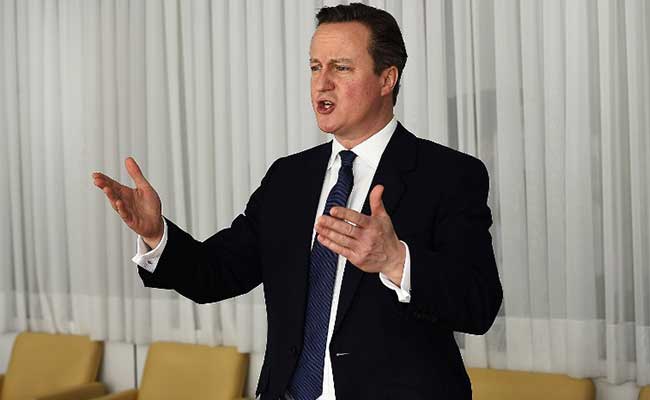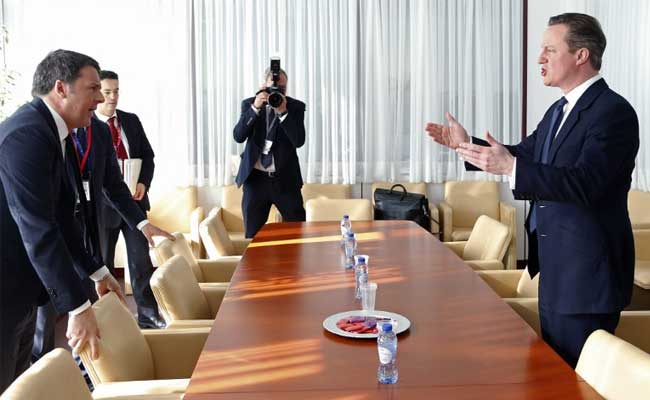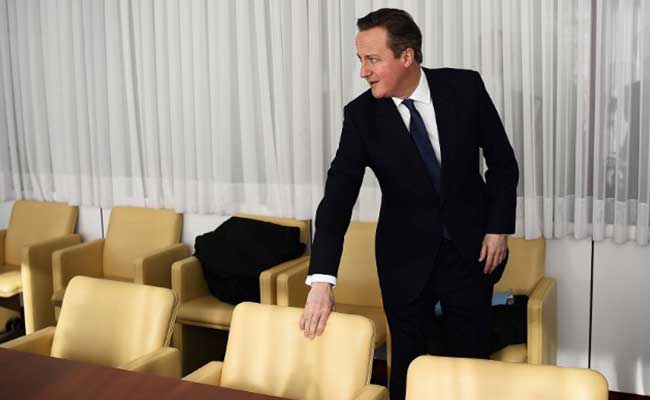
Even all-night negotiations failed to deliver an agreement to stop Britain crashing out of the EU. (AFP Photo)
Brussels, Belgium:
British Prime Minister David Cameron battled today to win over sceptical European leaders on a second day of summit talks, as tensions mounted over his demands for a reform deal to keep his country from leaving the EU.
Greece tried to extract concessions over the migrant crisis in exchange for backing an accord to avoid a "Brexit", adding to the resistance Cameron faced as he held a series of face-to-face talks with continental counterparts.
"We've made some progress but there is still no deal," Cameron said after getting just three hours of sleep following talks that went deep into the night.
"As I have said, I would only do a deal if we get what Britain needs, so we are going to get back in there," he added.
European leaders have dug their heels in over Cameron's reform demands, which include reducing welfare payments to EU migrants and opting out of a commitment to ever-closer union.
Cameron has said that without a satisfactory agreement, he will not campaign for Britain to stay in the 28-nation European Union in a referendum that he is expected to hold as early as June.
The British premier faces opposition from eastern European countries like Poland over his plans to limit access to benefits for migrants.
 He also faces trouble from France and Belgium over his bid to make clear that Britain is not committed to ever-closer union and ensure that the City of London financial district is not bound by rules governing the euro single currency area.
He also faces trouble from France and Belgium over his bid to make clear that Britain is not committed to ever-closer union and ensure that the City of London financial district is not bound by rules governing the euro single currency area.
Drama and Tension
Under pressure from eurosceptics in his Conservative Party and an anti-EU popular press, Cameron wants sweeping reforms to the EU which he hopes will stop Britain from becoming the first nation to leave the bloc.
The Brussels deadlock threatens to derail Cameron's plan to announce the date of the referendum in London Friday after securing a deal and flying home for an emergency Cabinet meeting.
On day one of the meeting Thursday, Cameron urged his fellow EU leaders to reach a "credible" reform deal, adding that the issue "has been allowed to fester for too long" and there was now a chance "to settle this issue for a generation".
Some European leaders warned Friday that Cameron's dramatic approach to reform may not pay dividends.
 "The method 'I tell you what you have to give me so that I will stay here' is not working. (You) have to compromise," said European Parliament President Martin Schulz.
"The method 'I tell you what you have to give me so that I will stay here' is not working. (You) have to compromise," said European Parliament President Martin Schulz.
Others highlighted what was at stake for other EU member states if Britain left.
"The deal is possible but timing it depends what kind of deepness of drama some countries want," Lithuanian President Dalia Grybauskaite told reporters.
Estonian PM Taavi Roivas added simply: "If the UK leaves the EU, we all get nothing".
Some nations also used tension of the Brexit threat to push their own demands.
A Greek government source said it wanted EU countries to promise to keep their borders open despite Europe's refugee crisis until a summit planned on March 6 -- or it would refuse to adopt a British deal.
'Autodestruction' Clause
Four eastern European countries including Poland are objecting to Cameron's request for a limit to welfare benefit payments for EU migrants working in Britain for four years to try and curb their numbers.
Brussels has offered an "emergency brake" which Britain could invoke for a limited period still to be defined if its welfare system is overwhelmed by the inflow of workers, as it believes it has been.
 Poland says its main outstanding problem relates to indexation -- the idea that the rate of child benefit paid to its citizens is tied to their country of residence.
Poland says its main outstanding problem relates to indexation -- the idea that the rate of child benefit paid to its citizens is tied to their country of residence.
Meanwhile, Belgian Prime Minister Charles Michel said other countries should not seek to capitalise on the British renegotiation to pursue their own reforms after the referendum.
Describing an "autodestruction" clause, he told reporters: "If the British say no, the texts which have been discussed will evaporate to prevent other countries who want to use these texts from taking hostile action against Europe."
Recent British opinion polls suggest a narrow lead for those who want to stay in the EU despite a modest increase in the 'No' camp. Many voters are thought to be undecided.
Greece tried to extract concessions over the migrant crisis in exchange for backing an accord to avoid a "Brexit", adding to the resistance Cameron faced as he held a series of face-to-face talks with continental counterparts.
"We've made some progress but there is still no deal," Cameron said after getting just three hours of sleep following talks that went deep into the night.
"As I have said, I would only do a deal if we get what Britain needs, so we are going to get back in there," he added.
European leaders have dug their heels in over Cameron's reform demands, which include reducing welfare payments to EU migrants and opting out of a commitment to ever-closer union.
Cameron has said that without a satisfactory agreement, he will not campaign for Britain to stay in the 28-nation European Union in a referendum that he is expected to hold as early as June.
The British premier faces opposition from eastern European countries like Poland over his plans to limit access to benefits for migrants.

Prime Minister David Cameron admitted there was "still no deal" as he headed into a second day of talks after all-night negotiations. (AFP Photo)
Drama and Tension
Under pressure from eurosceptics in his Conservative Party and an anti-EU popular press, Cameron wants sweeping reforms to the EU which he hopes will stop Britain from becoming the first nation to leave the bloc.
The Brussels deadlock threatens to derail Cameron's plan to announce the date of the referendum in London Friday after securing a deal and flying home for an emergency Cabinet meeting.
On day one of the meeting Thursday, Cameron urged his fellow EU leaders to reach a "credible" reform deal, adding that the issue "has been allowed to fester for too long" and there was now a chance "to settle this issue for a generation".
Some European leaders warned Friday that Cameron's dramatic approach to reform may not pay dividends.

British Prime Minister David Cameron (R) and his Italian counterpart Matteo Renzi (L) attend a bilateral meeting within a European Union leaders summit. (AFP Photo)
Others highlighted what was at stake for other EU member states if Britain left.
"The deal is possible but timing it depends what kind of deepness of drama some countries want," Lithuanian President Dalia Grybauskaite told reporters.
Estonian PM Taavi Roivas added simply: "If the UK leaves the EU, we all get nothing".
Some nations also used tension of the Brexit threat to push their own demands.
A Greek government source said it wanted EU countries to promise to keep their borders open despite Europe's refugee crisis until a summit planned on March 6 -- or it would refuse to adopt a British deal.
'Autodestruction' Clause
Four eastern European countries including Poland are objecting to Cameron's request for a limit to welfare benefit payments for EU migrants working in Britain for four years to try and curb their numbers.
Brussels has offered an "emergency brake" which Britain could invoke for a limited period still to be defined if its welfare system is overwhelmed by the inflow of workers, as it believes it has been.

David Cameron at European Union leaders summit on the so-called Brexit and migrants crisis, in Brussels. (AFP Photo)
Meanwhile, Belgian Prime Minister Charles Michel said other countries should not seek to capitalise on the British renegotiation to pursue their own reforms after the referendum.
Describing an "autodestruction" clause, he told reporters: "If the British say no, the texts which have been discussed will evaporate to prevent other countries who want to use these texts from taking hostile action against Europe."
Recent British opinion polls suggest a narrow lead for those who want to stay in the EU despite a modest increase in the 'No' camp. Many voters are thought to be undecided.
Track Latest News Live on NDTV.com and get news updates from India and around the world

